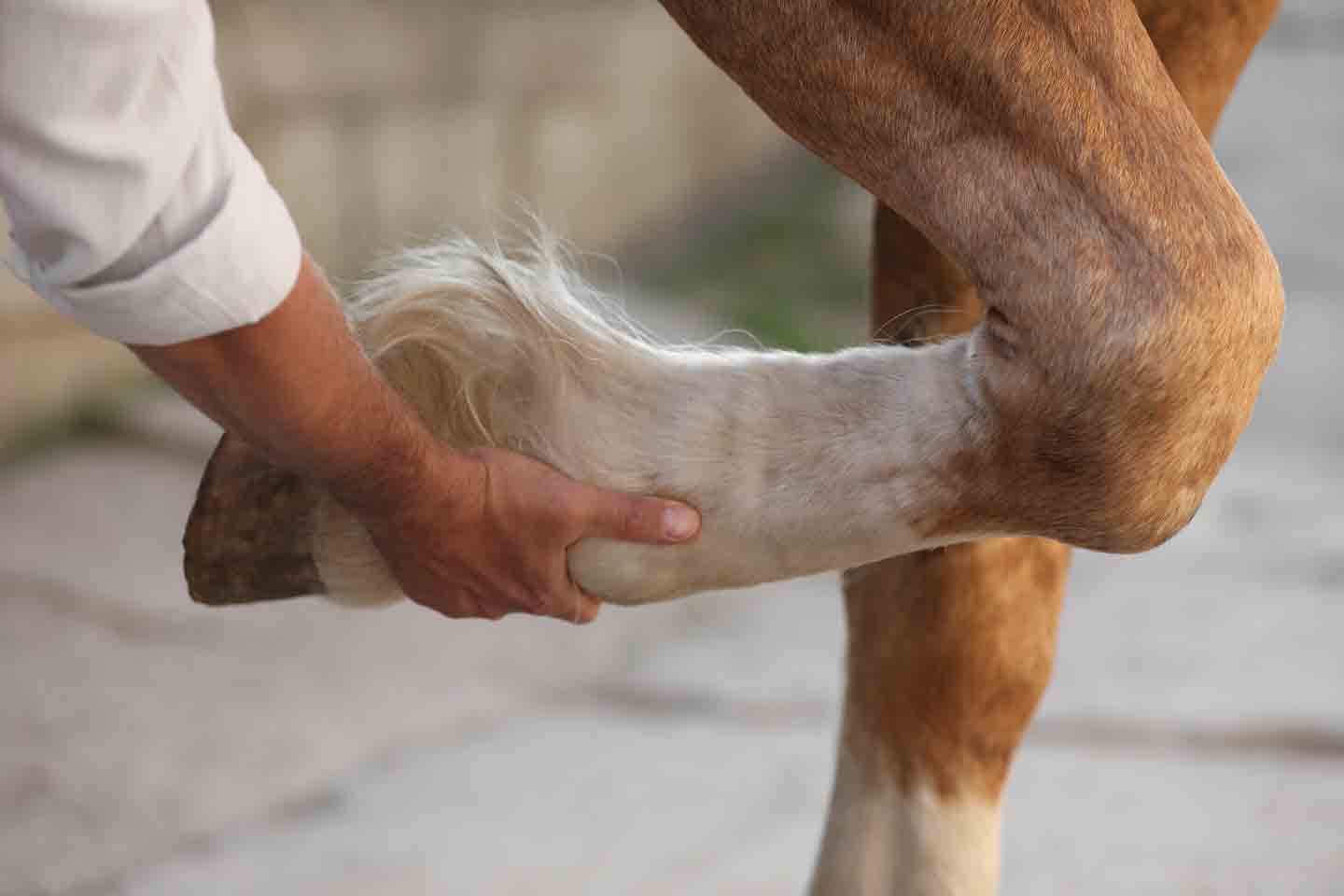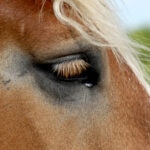Founder in Horses: Symptoms and Treatment for Laminitis

Photo by matthewleesdixon/Getty
Laminitis, or founder, is a painful condition that’s common in horses. It affects the hooves, has a variety of causes and, if left untreated, can result in permanent damage and death. This is an ailment that needs to be treated by a veterinarian promptly. Once a horse develops laminitis, they’re at risk of getting it again, so steps should be taken to prevent it.
As a horse owner, it’s important to know about founder risk factors so you can take steps to keep your horse healthy throughout their life. Here’s a short guide to founder in horses, including its causes, symptoms and more.
What Is Founder in Horses?
Founder, which is another name for laminitis, is inflammation of the laminae—the thin layers of tissue that connect the coffin bone (aka pedal bone) to the hoof wall. As the laminae become inflamed, they don’t get enough blood flow and become damaged.
When these connecting laminae are damaged, the coffin bone can rotate or sink inside the hoof. Although founder can develop in the hind hooves, it typically affects the front hooves. It can happen in one foot or multiple feet.
Laminitis causes pain and difficulty moving. Over time, the condition worsens, leading to permanent damage.
What Causes Founder in Horses?
Older horses tend to be at greater risk of founder. And even though all breeds can be affected, certain breeds, such as draft horses, Morgans and ponies, have a higher risk of developing laminitis. Also, if a horse has laminitis, they could get it again even if they recover.
“All horses are susceptible to getting this condition, but horses who are overweight or have a metabolic condition are affected the most,” says Dr. James A. Giacopuzzi, DVM, and farrier at Rolling Hills Estates, California, whose general equine practice focuses on lameness and corrective shoeing.
Some of the main causes of laminitis/founder in horses are:
Improper Feeding and Obesity
Overfeeding a horse, particularly giving them too many grains, starches and sugars, can lead to founder. Obesity can also increase the risk of founder. And if a horse consumes too much lush pasture which is high in sugars and starch, they could develop “grass founder.” If a horse consumes a large amount of grain quickly, this can also predispose them to founder.
Other Health Problems
A horse may be more susceptible to founder if they have an underlying illness, such as metabolic problems, insulin resistance or high fever. Examples of conditions that could lead to laminitis include Cushing’s disease (also known as pituitary pars intermedia dysfunction or PPID), Potomac horse fever (PHF) and equine metabolic syndrome (EMS). Sepsis, colic and retained placenta after foaling can also be to blame due to the high levels of toxins flowing throughout the body.
Toxins
Horses who are exposed to toxins (e.g., black walnut shavings or chicken feed), or who have a compromised gastrointestinal tract that allows the spread of toxins to other parts of the body, may be more susceptible to founder.
Injuries
If an injury causes a horse to bear most of their weight on one leg, or they have an abnormal gait because they’re hurt, they might develop laminitis due to excessive pressure and weight on such a small surface for a prolonged period of time. A horse requires movement for proper circulation that moves blood and lymphatic fluid up and out of the foot. Also, “road founder” can occur if a horse spends too much time on hard surfaces.

Liudmila Chernetska/Getty
Symptoms of Founder in Horses
While there are clinical signs that you can look for, it’s best to have your horse’s hooves evaluated by a veterinarian if you suspect they have founder.
Laminitis can be acute or chronic. Acute laminitis typically manifests with sudden and severe symptoms, while chronic laminitis involves prolonged and often recurring episodes, resulting in ongoing hoof damage and discomfort for the horse.
Symptoms of acute laminitis include:
- Changes in posture: If the front feet are affected, a horse might take a sawhorse stance, where they stretch their front legs forward and put their back legs under their body. This is done to try to take weight off the front feet that hurt.
- Lameness: A horse with laminitis will exhibit signs of discomfort or severe pain when walking. They might shift their weight, have trouble circling and want to lie down more. One or more hooves could be affected, and there may be changes in gait.
- Pain: In addition to showing signs of pain when moving, a horse may show pain when a farrier or veterinarian uses a hoof tester over the toe area. This is where the tip of the coffin bone points, so if it is sinking or rotating it will be closer to the sole than usual and be much more sensitive. They might also make it hard for you to lift their forelimb, and there might be swelling in the limbs.
- Changes in hoof and pulse: When checking your horse’s hoof, you may notice the coronary band (tissue at the junction between the skin of the lower leg and the hoof) is warm. When checking the digital pulse (the pulsation felt in the digital arteries of the hoof where the vessels run over the sides of the fetlock), it may be fast and strong.
Symptoms of chronic laminitis include:
- Coffin bone displacement/rotation of the coffin bone, which is seen via radiographs
- “Dished” hoof (when the underlying bone is pulled away from the hoof wall)
- Hoof ridges or abnormal growth rings
- Weight loss
- Seedy toe, also known as white line disease
- Bruised or dropped sole
- Hoof abscess
Diagnosing Founder in Horses
According to Dr. Giacopuzzi, a veterinarian can diagnose founder through a clinical exam and radiographs (X-rays) that check for rotation and sinking.
The exam will include the use of hoof testers to look for signs of pain. The vet will also check your horse’s body condition, digital pulses, mobility, stance and gait. Blood tests may be used to look for inflammation and underlying conditions associated with laminitis, such as PPID or metabolic syndrome.
Letting your veterinarian know about your horse’s history will help with diagnosis. Be sure to inform your vet if you’ve changed your horse’s diet, they’ve been diagnosed with any other health conditions or been injured, or they’re taking any medications.
Treatment for Founder in Horses
Your veterinarian will determine the best treatment protocol for your horse based on a variety of factors, including the cause of the founder and how severe it is.
Unfortunately, the damage from founder isn’t reversible; instead, the goal is to stop it from worsening and causing more harm. Getting your veterinarian’s help right away is critical.
Solutions that can be prescribed include:
- Medication: Medicines, such as anti-inflammatories and NSAIDs, can be prescribed for inflammation and pain. Dr. Giacopuzzi says bute and Banamine can be used when treatment is started, and he also recommends dimethyl sulfoxide (DMSO). If your horse has a systemic condition like equine metabolic syndrome (EMS) or an injury that led to laminitis, your veterinarian will recommend medications to treat the underlying problem
- Dietary changes: Adjusting your horse’s diet might be necessary, especially if improper feeding contributed to the laminitis or your horse is overweight or obese. For example, your vet might tell you to reduce the amount of carbohydrates to create a balanced diet and support a healthy weight. These changes might need to be permanent to help prevent future problems.
- Cold therapy: This treatment can help reduce inflammation. Dr. Giacopuzzi recommends using real ice rather than ice boots for “icing the feet twice a day for an hour for the first five days.”
- Hoof care: Horses may need stall rest, and their bedding should be deep. A farrier can ensure your horse’s hoof is properly trimmed. Your veterinarian may recommend that any excessive toe be removed to help improve the breakover point when the horse walks, to lessen stress on the inflamed laminae.
- Surgery: Severe cases of founder might require surgery. “Some badly chronic cases, especially ponies, may need surgery to cut the deep digital flexor tendon (DDFT) so rotation stops,” says Dr. Giacopuzzi. This is only used as a last resort as surgery can have its own risk factors and complications long term.
How To Help Prevent Founder in Horses
Fortunately, there are some things you can do to help prevent laminitis or founder in your horse. And if your horse has already had it, your veterinarian will guide you on how to stop it from happening again.
You might need to make long-term changes to the way you feed and care for your horse to keep founder at bay. Talk to your veterinarian about the best foods to feed and how much to feed daily to give your horse the nutrition they need and avoid unwanted weight gain. In the spring, in particular, you may need to keep your horse from lush pasture that can lead to laminitis. Allowing them to graze only during certain times of day, or using a grazing muzzle for horses that are overweight or that have underlying metabolic conditions, may be recommended.
In addition to having your horse checked by a veterinarian regularly, work with a farrier who will take care of your horse’s hooves. Vets and farriers can recognize early signs of health problems, from endocrine problems to hoof infections and abnormal hoof growth, so they can be treated before they progress.
FAQs About Founder in Horses
Can a foundered horse recover?
What’s the difference between laminitis and founder?
As a horse owner, being aware of the many health problems that can affect horses, young and old, is key. After all, you want to do everything you can to keep your companion strong, happy and healthy. Next, learn about the benefits of different types of horse boots.
Specialist input for this story provided by Dr. James A. Giacopuzzi, DVM, farrier, based in Rolling Hills Estates, California.
This content was medically reviewed by Chewy vets.




